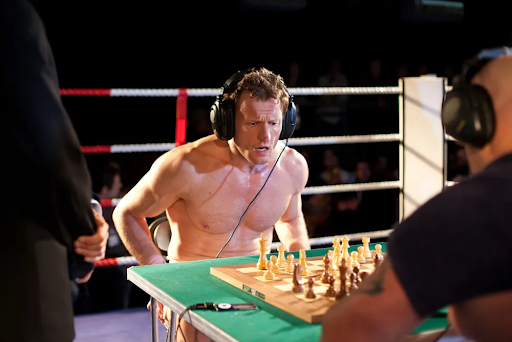
Chess has never been more intense.
In case you were looking for a serious sport, this is not it. Welcome to the weird world of chessboxing, where fighters put both their brains and their brawn to the test. First thought of by French comic book artist Enki Bilal in 1979 as a piece of performance art, the first “modern” Chessboxing competition took place in Amsterdam of 2003, founded by performance artist Iepe Rubingh. It has been covered by several major news outlets such as CNN or the Los Angeles Times. In 2008, the International Chess Federation, FIDE, recognized Chessboxing for the first time when its president took part in a fight himself.
Chess boxing consists of alternating rounds of both chess and boxing, going until someone wins in either game (a knockout or a checkmate), or the opponent resigns. A player can also lose in the case they break too many rules in boxing. Players are separated by weight class (lightweight, middleweight, light heavyweight, and heavyweight), and they train for about 6 months prior to a match. There are six, four-minute rounds of chess interspersed with five bouts of boxing.
At first glance, chess and boxing seem like two disciplines from the opposite ends of the Earth. However, they are more similar than you might think. Both have been practiced in human society for thousands of years, both require a great amount of stamina, and both take large amounts of dedication to master. They are both defined by the fact that once you make a move, you cannot take it back. The permanence of actions in these sports makes them go together quite well.
So what do you need to start Chessboxing? First, you need to have attained a chess rating of 1000 Elo, something that normally takes a couple months to do for beginner chess players. Players need both mental and physical stamina, and should be above 17 years of age. While chessboxing was originally seen as an elitist sport, it has become more accessible due to a large amount of interest from different groups of people. Chessboxing has become popular in communities from the United Kingdom to Finland to India, and is only increasing in popularity.
However, the future of chessboxing is not all bright. As with many other smaller sports, it has been dealt a major blow due to the pandemic, and with the sudden death of Iepe Rubingh, its founder, in 2020, the World Chess Boxing Organization has faced many challenges in the past half decade. However, if the past is any indicator of the future, people will continue to love this strange but deeply cherished sport.
[1] https://chessboxingnation.com/the-history-of-chessboxing/
